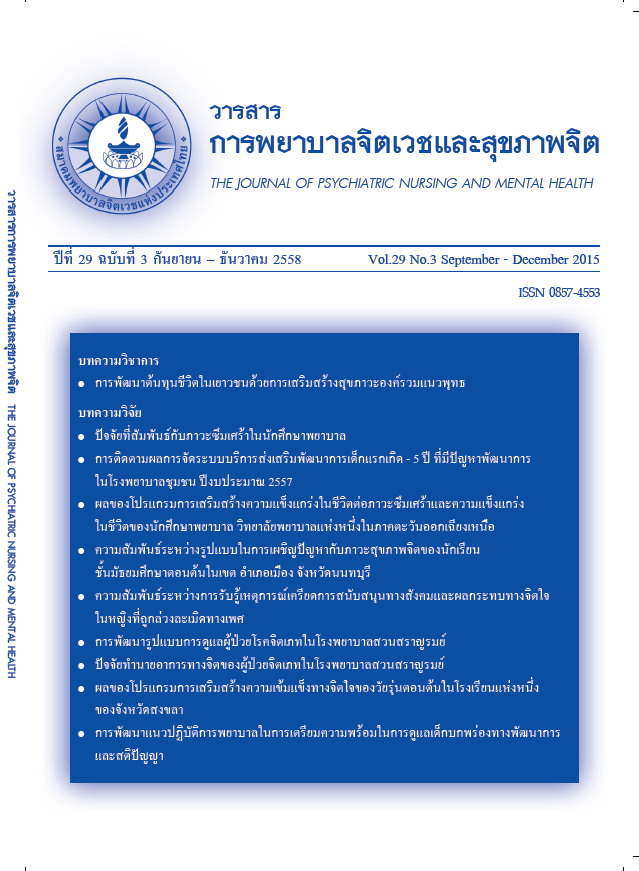ผลของโปรแกรมการเสริมสร้างความเข้มแข็งทางจิตใจของวัยรุ่นตอนต้น ในโรงเรียนแห่งหนึ่งของจังหวัดสงขลา EFFECT OF RESILIENCE ENHANCING PROGRAM IN EARLY ADOLESCENTS IN A SCHOOL IN SONGKHLA PROVINCE
Main Article Content
บทคัดย่อ
Objectives: The resilience enhancement is important for building self-confidence and motivation to deal with problems. The purpose of this quasi-experimental research was to examine the effect of the resilience enhancement program of early adolescents.
Methods: Sixty junior high school students in Songkhla province were purposively selected using low resilience score as inclusion criteria. Sample was assigned into the experimental or the control group with 30 subjects in each group and both groups were similar in level of resilience scores. The experimental group received the Resilience Enhancement Program whereas the control group performed their usual daily life. The research instruments were the Resilience Enhancement Program which was developed by the researcher based on Grotberg’s concept of Resilience (Grotberg, 1995). The content validity of the program was approved by experts. The instruments for data collection included the personal demographic questionnaire and Resilience Questionnaire which was developed by Penprapa Parinyaphol (2007). Cronbach’s alpha coefficient of the Resilience Questionnaire was .76. Data were analyzed using descriptive statistics, independent t-test, and dependent t-test.
Results: The results of this study revealed as follows:
1. The resilience mean score of the students after receiving the resilience enhancement program was statistically and significantly higher than that before (p < .05)
2. After implementing the program, the resilience mean score of the experimental group was not statistically and significantly different from that of the control group.
วัตถุประสงค์: การเสริมสร้างความเข้มแข็งทางจิตใจในวัยรุ่นตอนต้นเป็นส่วนสำคัญในการสร้างความเชื่อมั่นและกำลังใจในการต่อสู้กับปัญหาต่าง ๆ ที่อาจเกิดขึ้น การวิจัยกึ่งทดลองครั้งนี้มีวัตถุประสงค์เพื่อศึกษาผลของโปรแกรมการเสริมสร้างความเข้มแข็งทางจิตใจของวัยรุ่นตอนต้น
วิธีการศึกษา: กลุ่มตัวอย่างเป็นนักเรียนในระดับชั้นมัธยมศึกษาปีที่ 1-3 ของโรงเรียนแห่งหนึ่งในจังหวัดสงขลา มีการเลือกแบบเจาะจงในนักเรียนที่ระดับคะแนนความเข้มแข็งทางจิตใจ (resilience) ต่ำสุดจำนวน 60 คนแรก แบ่งเป็นกลุ่มทดลอง 30 คน และกลุ่มควบคุม 30 คน โดยยึดเกณฑ์ความเหมือนหรือความคล้ายคลึงกันของคะแนนความเข้มแข็งทางจิตใจในการสุ่มแต่ละระดับชั้น กลุ่มทดลองได้รับโปรแกรมการเสริมสร้างความเข้มแข็งทางจิตใจและกลุ่มควบคุมมีการดำเนินชีวิตตามปกติ เครื่องมือที่ใช้ในการวิจัยประกอบด้วยโปรแกรมเสริมสร้างความเข้มแข็งทางจิตใจที่ผู้วิจัยสร้างขึ้นจากกรอบแนวคิดความเข้มแข็งทางจิตใจ (resilience) ของกรอทเบอร์ก (Grotberg, 1995) และตรวจสอบ ความตรงตามเนื้อหาโดยผู้ทรงคุณวุฒิ เครื่องมือที่ใช้ในการรวบรวมข้อมูลได้แก่ แบบสอบถามข้อมูลส่วนบุคคล และแบบประเมินความยืดหยุ่นและทนทานของ เพ็ญประภา ปริญญาพล (2550) เพื่อประเมินความเข้มแข็งทางจิตใจโดยค่าสัมประสิทธิ์แอลฟ่าของครอนบาค เท่ากับ .76 การวิเคราะห์ข้อมูลใช้สถิติเชิงพรรณนา และสถิติทดสอบค่าทีชนิด 2 กลุ่มที่เป็นอิสระต่อกัน และสถิติค่าทีชนิด 2 กลุ่มที่ไม่เป็นอิสระต่อกัน
ผลการศึกษา: ผลการวิจัยมีดังนี้
1. ค่าเฉลี่ยความเข้มแข็งทางจิตใจของนักเรียนที่ได้รับโปรแกรมส่งเสริมความเข้มแข็งทางจิตใจ สูงกว่าก่อนได้รับโปรแกรมอย่างมีนัยสำคัญทางสถิติที่ระดับ .05
2. หลังสิ้นสุดโปรแกรม ค่าเฉลี่ยความเข้มแข็งทางจิตใจของนักเรียนที่ได้รับโปรแกรมฯ
ไม่แตกต่างจากกลุ่มที่ไม่ได้รับโปรแกรม
Article Details
บทความที่ได้รับการตีพิมพ์แล้ว เป็นลิขสิทธิ์ของสมาคมพยาบาลจิตเวชแห่งประเทศไทย


